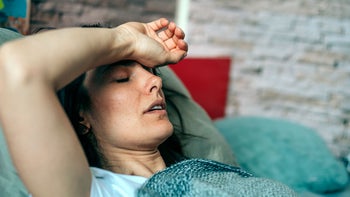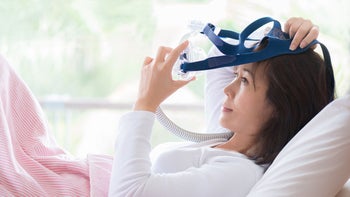GoodRx Guide
Healthy Sleep: Your GoodRx Guide
Sleep is an active, complex process involving several parts of the brain. During the night, you cycle through two types of sleep: rapid eye movement (REM) and non-rapid eye movement (NREM) sleep. Within these two types of sleep, there are four stages:
Stage 1: During this NREM stage, your heart rate, breathing, and brain waves begin to slow.
Stage 2: Stage 2 is also NREM sleep. Your heart rate and breathing slow down even further, and your temperature drops to prepare for deep sleep. Your brain waves also continue to slow down, although there are brief episodes of electric activity during this stage.
Stage 3: Your deepest sleep occurs in NREM stage 3. This is when your heart rate and breathing reach their lowest levels, and your muscles are so relaxed that it's difficult to wake you.
REM sleep: During REM sleep, your eyes dart side to side, and your heart rate, breathing, and other bodily functions heighten. Your dreams are most vivid during this time. REM sleep is essential for learning, memory, and emotional regulation.
In one night, you cycle through each stage multiple times, with longer and deeper stretches of REM sleep as you inch toward morning.
Why is sleep important?
Why do we spend one-third of our lives sleeping? The short answer is, we don’t know. But there are some leading theories about the benefits of sleep, including that sleep:
Solidifies memories: Sleep and memory have a close relationship. Quality sleep helps you process information you learn throughout the day. And sleep then allows your brain to store that information as memory.
Conserves energy: Research has shown that your energy metabolism (the process of gaining energy from nutrients) slows down while you sleep, helping you conserve energy for the day.
Restores and repairs the body: This long-held theory is backed by the fact that muscle growth, tissue repair, growth hormone release, and major restorative functions in the body occur primarily during sleep.
Removes toxins from the brain: Research in mice has suggested a new theory that sleep helps “detoxify” the mind. A 2013 study found that the space between brain cells increased when mice were sleeping, allowing the cells to clear away waste products more efficiently.
Search and compare options
How much sleep do you need?
So how much sleep do you actually need? Knowing the general guidelines can help you determine if you’re sleeping a healthy amount. Keep in mind, however, that individual sleeping requirements might vary depending on things like your overall health and daily activities. In other words, there is some “wiggle room” to the these guidelines from the National Sleep Foundation:
| Age Range | Recommended Sleep Hours |
|---|---|
| 0 to 3 months | 14 to 17 hours |
| 4 to 12 months | 12 to 16 hours |
| 1 to 2 years | 11 to 14 hours |
| 3 to 5 years | 10 to 13 hours |
| 6 to 12 years | 9 to 12 hours |
| 13 to 18 years | 8 to 10 hours |
| 18 to 60 years | 7 or more hours |
| 61 to 64 years | 7 to 9 hours |
| 65 years and older | 7 to 8 hours |
If you’re concerned that you’re sleeping too little or too much, reach out to your healthcare provider. They can help you figure out if there is a reason for your change in sleep, as well as offer helpful solutions to the problem.
What happens if you don’t get enough sleep?
It’s normal to have a sleepless night occasionally. Maybe you have a lot on your mind, a newborn baby is keeping you awake, or you had coffee too late in the day. The next day, you’ll likely wake up feeling a little foggy and feel less alert throughout the day. These consequences can affect your quality of life and relationships and even make you more likely to get into a car accident.
But the physical health problems associated with lack of sleep tend to appear with chronic sleep deprivation (poor sleep for 3 months or longer). Long-term sleep deprivation increases someone’s risk of:
Depression
Diabetes
High blood pressure
Heart disease
Stroke
Decrease in immune function
Skin aging
Unintentional weight gain
Alcohol use
Tips to improve sleep
Having trouble sleeping can be frustrating and lonely. Take a deep breath, zoom out, and evaluate the quality of your sleep hygiene (the healthy habits, behaviors, and environment that promote good sleep). You might find that there’s room for improvement. We can help. Here are 9 tips to improve your sleep quality and quantity:
Avoid screens an hour before bed.
Avoid caffeine up to 6 hours before bed.
Use your bed for sleep and intimate activities only.
Have a consistent bedtime and wake time.
Get exercise in the morning and sunlight during the day.
Don’t drink alcohol before bed.
Keep your bedroom cool and dark.
Avoid excessive daytime napping.
Have a wind-down routine, including deep breathing or meditation.
What about sleep disorders?
If you’re following all the proper sleep hygiene tips and can’t pinpoint the cause of your poor sleep, you may have a sleep disorder. But there’s only one way to know for sure: Talk to your healthcare provider. There are more than 80 sleep disorders, but here are four common ones:
Insomnia: Insomnia is the most common sleep disorder. With insomnia, you may have difficulty falling asleep or staying asleep. Or you might wake up too early.
Sleep apnea: Sleep apnea involves pauses in breathing while sleeping. The only symptom you might notice is that you’re excessively sleepy during the day. If you sleep with a partner, they might hear loud snoring, snorts, and gasps.
Restless leg syndrome: Restless leg syndrome (RLS) is a condition of the nervous system that causes an intense, uncontrollable urge to move your legs. This symptom affects a person’s ability to sleep.
Narcolepsy: Narcolepsy is a neurological disorder that causes excessive daytime sleepiness and “sleep attacks” where a person falls asleep at inappropriate times.
Common concerns
When exposed to darkness, your body makes the hormone melatonin to help you transition into sleep mode. But you can also take synthetic melatonin in the form of supplements. These supplements mimic the natural process that happens when your body prepares to sleep. But do they work?
Some studies show that melatonin supplements may help with certain sleep disorders, such as delayed sleep-wake phase disorder (delay in falling asleep) and insomnia. Additional studies also suggest that it could help with some sleep disorders in children. But the supplement may not work for everyone. And there is still a lot that researchers don’t understand about the effects of melatonin on the body. Consult your healthcare provider before adding the supplement to your regimen.
In general, if your poor sleep affects your day-to-day life, it’s best to talk to a healthcare provider. Even a short period of poor sleep can have negative mental and physical health effects, making it important to address it before it becomes a bigger problem. Another way to determine if you need to see a healthcare provider is to ask yourself, “Am I frequently tired?” If the answer is yes, a provider can help you determine if poor sleep is the cause.
References
American Academy of Sleep Medicine. (2008). Sleep deprivation.
Aminoff, M. J., et al. (2011). We spend about one-third of our life either sleeping or attempting to do so. Handbook of Clinical Neurology.
Centers for Disease Control and Prevention. (2016). Tips for better sleep.
Elkhenany, H., et al. (2018). Tissue regeneration: Impact of sleep on stem cell regenerative capacity. Life Sciences.
Ferracioli-Oda, E. et al. (2013). Meta-analysis: Melatonin for the treatment of primary sleep disorders. PLOS One.
Hirshkowitz, M., et al. (2015). National Sleep Foundation's sleep time duration recommendations: Methodology and results summary. Sleep Health.
Institute of Medicine (U.S.) Committee on Sleep Medicine and Research. (2006). Extent and health consequences of chronic sleep loss and sleep disorders. National Academies Press.
MedlinePlus. (2020). Sleep disorders.
National Highway Traffic Safety Administration. (n.d.). Drowsy driving.
National Institute of Neurological Disorders and Stroke. (2022). Brain basics: Understanding sleep.
Pacheco, D. (2022). Memory and sleep. Sleep Foundation.
Ritsche, K., et al. (2014). Exercise-induced growth hormone during acute sleep deprivation. Physiological Reports.
Sharma, S., et al. (2010). Sleep and metabolism: An overview. International Journal of Endocrinology.
Wei, S., et al. (2020). Efficacy and safety of melatonin for sleep onset insomnia in children and adolescents: A meta-analysis of randomized controlled trials. Sleep Medicine.
Xie, L., et al. (2013). Sleep drives metabolite clearance from the adult brain. Science.
Zielinski, M. R., et al. (2016). Functions and mechanisms of sleep. AIMS Neuroscience.






























